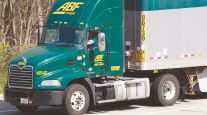NAFTA Talks Expose Disagreement Over Mexican Trucking Access

As efforts to renegotiate terms of the North American Free Trade Agreement shift from Ottawa to Washington, two trucking industry groups and the Teamsters union are taking aim at a provision in the current agreement that allows trucks from Mexico to operate in the United States.
Todd Spencer, executive vice president of the Owner-Operator Independent Drivers Association, in a letter to U.S. Trade Representative Robert Lighthizer on Sept. 28, said the original NAFTA trucking provision harms American truckers and jeopardizes highway safety.
In a new agreement, Spencer said that OOIDA and the Teamsters union want longhaul trucking to be classified as an exempt service, effectively limiting Mexican carriers to operating within border zones.
American Trucking Associations Chief Economist Bob Costello responded with a letter in which he urged Lighthizer to support the Mexican truck program and decried what he said was “fearmongering” about Mexican trucks driving beyond the commercial border zones.
Attending @canacarmexico annual meeting. Mexican trucking industry has many of the same issues as we do. @rmontemayorm @martindrojas pic.twitter.com/xuoTAftjt9 — Bob Costello (@ATAEconBob) October 5, 2017
“The Mexican trucking program is not an open door policy that permits any and all Mexican trucking companies to haul freight beyond the border zones,” Costello said. “Mexican carriers undergo a case-by-case review process before the U.S. Department of Transportation grants them authority to operate.”
The largest Mexican-domiciled carrier in the program, representing more than half of the drivers permitted to drive beyond the border zone, is owned by an American trucking company, he pointed out.
NAFTA’s trucking provisions reduce congestion at the border, Costello argued, by reducing the number of trucks making one-way trips.
“This provision will be more important as trade increases,” Costello wrote. “It would be shortsighted to end the program now.”
The latest data on NAFTA trade show a continuing surge in the value of goods moving among the United States, Canada and Mexico.

In July, the value of NAFTA freight totaled $89.2 billion, a 6.2% rise from the same month a year ago and the ninth consecutive monthly increase, the U.S. Department of Transportation Bureau of Transportation Statistics reported Oct. 4. The value of goods moving by truck grew 4%, while rail shipments increased 4.4% and shipment by vessels and pipeline surged 24% and 23.1%, respectively, due in part to an increase in the volume of fuel imports.
Teamsters President James Hoffa said the top issues in a new trade deal for union members in the United States and Canada is to strengthen workers’ rights to organize, improve highway safety and preserve market access rules for Canadian dairy products.
In addition, the Teamsters wants to eliminate a dispute settlement mechanism in NAFTA that allows corporations to sue governments.
With members in longhaul trucking and freight rail, ports and warehouses, plus manufacturing and food processing, Hoffa said the Teamsters is North America’s supply chain union and will work to make sure that the new NAFTA “works for working families.”
In a joint statement issued after the conclusion of the third round of NAFTA negotiations in Ottawa from Sept. 23-27, Canadian Foreign Affairs Minister Chrystia Freeland, Mexican Secretary of the Economy Ildefonso Guajardo and Lighthizer said progress was made in the areas of telecommunications, competition policy, digital trade, regulatory practices, and customs and trade facilitation. The parties also exchanged initial offers in the area of market access for government procurement.
Discussions were substantively completed in the area of small- and medium-size enterprises, and representatives said they expect to conclude negotiations on the competition chapter before the next round of talks.
“We continue to push for ways that will reduce the U.S. trade deficit,” Lighthizer said in a statement after the end of talks in Ottawa. “We are committed to a substantial renegotiation that reinvigorates U.S. industry and ensures reciprocal market access for American farmers, ranchers and businesses. … I am hoping that our countries are capable of producing a new NAFTA that will fuel economic growth for all of us in North America in the years to come.”
The next round of talks is scheduled for Oct. 11-15.




